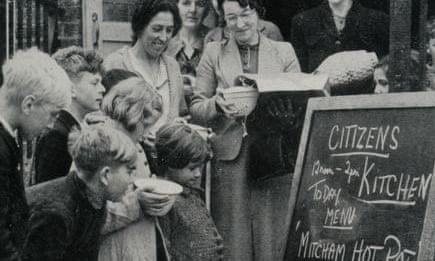Have attitudes to people in poverty changed over a lifetime? Bob Holman put this to Guardian readers a year ago. He referred to a report on urban poverty written in 1943 by eight members of the hygiene committee of the Women’s Group on Public Welfare. Our Towns: A Close-Up was commissioned to investigate complaints from people in rural England about families evacuated from inner cities. Children were reported as dirty, inadequately clothed and badly behaved, and their parents were blamed as lazy and incompetent. Politicians and media reports supported this analysis.
The authors visited poor neighbourhoods and put a spotlight on the conditions that made life tough for the people who lived there. Instead of fuelling the growing hostility, they challenged public attitudes. They showed how resilient and resourceful families had to be to survive circumstances that most people would find overwhelming. The report was debated in parliament and influenced the Beveridge reforms that shaped the postwar welfare state.
Today the infrastructure of welfare support is under attack. Social security is deemed too costly; the principles of mutual support and solidarity are being replaced by selfish individualism. People in poverty are labelled shirkers and feel ashamed to claim the welfare support they need. Negative attitudes are reinforced by sensationalist media and opportunistic politicians, and the nasty and divisive public rhetoric that has emerged demonises those living in poverty in ways that are reminiscent of the early 1940s. It was this comparison that led Holman to call for a modern-day Our Towns.
Last week, we launched Our Lives: Challenging Attitudes to Poverty in 2015 – a report that gives a voice to people struggling to make ends meet, striving to support their families and trying to retain their dignity and self-respect in the face of grinding poverty and hardship.
People like Alice – a single mum searching for work that fits in with looking after her two young children. She is caught by the bedroom tax and hassled by the jobcentre, which insists on her applying for work online even though she can’t use a computer. She struggles to feed her family and lives in fear of having her children taken into care if she can’t cope.
People like Chris – who was sanctioned for being 10 minutes late for a jobcentre interview. Road works had delayed his bus journey and he was unable to phone to let them know. He felt humiliated in public by the advisers who refused to accept his explanation. They punished him by denying him benefits for four weeks, forcing him to rely on a food bank for survival.
People like Laura – a care worker on a zero-hours contract who gets no pay for travel time between home visits. She told us: “Last Sunday, I worked for six hours but got paid for three. I am effectively paid less than the minimum wage. We are finding it harder and harder to keep our heads above water.”
The 20 stories in the report paint a picture of life that is harsh and precarious. Public services, designed to support and help people, often compound their difficulties. Private sector services seem indifferent to their most vulnerable “clients” and loan sharks exploit people who they know are desperate. The poorest are bearing a disproportionate burden of the cost of recovery from the financial crisis that they played no part in creating. And the major political parties intend to reduce welfare spending even more. The authors of Our Lives believe this kind of brutality diminishes us all – rich, poor and everyone in between. We can do better than this.
In 1943, Our Towns proved that radical achievements are possible even in austere times. But it takes strong moral leadership. It takes politicians with the courage to stand up for the most vulnerable, to dispel fear and prejudice, and to insist that the voices of those striving to overcome poverty are heard – they can help shape the policies we need for a better, kinder and more equal society.
